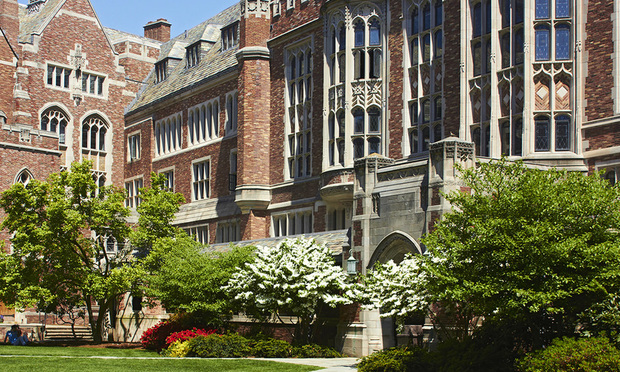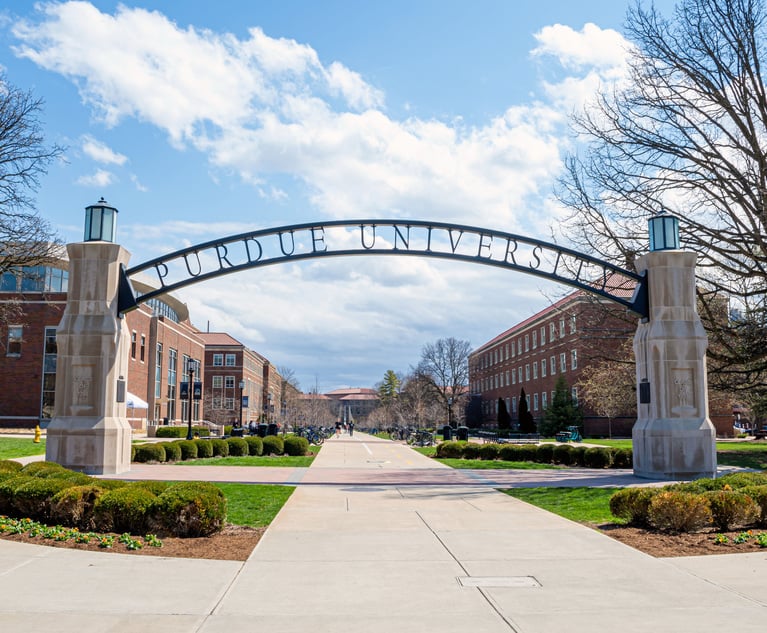Poll: Don't Put Too Much Stock in U.S. News Law School Rankings
The publication's annual list looms large in the law school application landscape, yet more than half of recent grads say applicants put too much stock in the list.
March 20, 2018 at 02:29 PM
3 minute read

To be happy in law school, J.D.-seekers should look beyond the U.S. News & World Report rankings when choosing where to enroll.
A new survey of recent law graduates found that a slim majority said applicants place too much importance on the U.S. News rankings when choosing a law school.
Just over half—51 percent—of the 2017 law graduates polled by Kaplan Bar Review last month said applicants give the rankings too much weight when making enrollment decisions. Another 37 percent of the 201 respondents said applicants place the right amount of value on the U.S. News rankings, while the remaining 12 percent said the rankings are valued too little by applicants.
“A school's ranking doesn't necessarily get you happiness or a good experience as a law school student or graduate,” said Tammi Rice, vice president of Kaplan Bar Review. “Our experience is that it's a statistic much more important to law school administrators, as it's understandably an important recruitment and fundraising tool.”
Indeed, law deans love to hate the annual U.S. News rankings. Among the most common criticism of the ranking is the emphasis it places on the median Law School Admission Test score of each school's incoming students. Critics say their rankings formula encourages schools to put money toward merit-based scholarships to lure high LSAT scorers at the expense of need-based scholarships. U.S. News' formula also rewards schools that spend more per student and have low student-faculty ratios, which discourages cost cutting and lower tuition. Legal educators have also charged that the rankings' reliance on reputational assessments by academic, lawyers and judges is at the root of so-called “law porn”—the glossy brochures and magazines extolling the virtues of a campus that clog up the mailboxes of those who may fill out U.S. News' surveys.
The U.S. News rankings play an outsized role in law school admissions partly because it's the only major ranking of law campuses. By contrast, business schools are ranked by numerous national publications.
“Our advice to aspiring lawyers has always been that while rankings can play a useful role in helping them decide where to apply, they should look closely at other statistics, including how many of a law school's graduates have found a job in the legal field and what the law school's bar passage rate is,” Rice said. “You cannot be a practicing attorney without passing the bar.”
This content has been archived. It is available through our partners, LexisNexis® and Bloomberg Law.
To view this content, please continue to their sites.
Not a Lexis Subscriber?
Subscribe Now
Not a Bloomberg Law Subscriber?
Subscribe Now
NOT FOR REPRINT
© 2025 ALM Global, LLC, All Rights Reserved. Request academic re-use from www.copyright.com. All other uses, submit a request to [email protected]. For more information visit Asset & Logo Licensing.
You Might Like
View All
Librarian's Termination Violated First Amendment Protections, Lawsuit Claims
3 minute read
Divided State Supreme Court Clears the Way for Child Sexual Abuse Cases Against Church, Schools

Longtime Purdue GC Accused of Drunken Driving Hires Big-Name Defense Attorney
3 minute read
LSU General Counsel Quits Amid Fracas Over First Amendment Rights of Law Professor
7 minute readTrending Stories
- 1Transgender Care Fight Targets More Adults as Georgia, Other States Weigh Laws
- 2Roundup Special Master's Report Recommends Lead Counsel Get $0 in Common Benefit Fees
- 3Georgia Justices Urged to Revive Malpractice Suit Against Retired Barnes & Thornburg Atty
- 4How Gibson Dunn Lawyers Helped Assemble the LA FireAid Benefit Concert in 'Extreme' Time Crunch
- 5Lawyer Wears Funny Ears When Criticizing: Still Sued for Defamation
Who Got The Work
J. Brugh Lower of Gibbons has entered an appearance for industrial equipment supplier Devco Corporation in a pending trademark infringement lawsuit. The suit, accusing the defendant of selling knock-off Graco products, was filed Dec. 18 in New Jersey District Court by Rivkin Radler on behalf of Graco Inc. and Graco Minnesota. The case, assigned to U.S. District Judge Zahid N. Quraishi, is 3:24-cv-11294, Graco Inc. et al v. Devco Corporation.
Who Got The Work
Rebecca Maller-Stein and Kent A. Yalowitz of Arnold & Porter Kaye Scholer have entered their appearances for Hanaco Venture Capital and its executives, Lior Prosor and David Frankel, in a pending securities lawsuit. The action, filed on Dec. 24 in New York Southern District Court by Zell, Aron & Co. on behalf of Goldeneye Advisors, accuses the defendants of negligently and fraudulently managing the plaintiff's $1 million investment. The case, assigned to U.S. District Judge Vernon S. Broderick, is 1:24-cv-09918, Goldeneye Advisors, LLC v. Hanaco Venture Capital, Ltd. et al.
Who Got The Work
Attorneys from A&O Shearman has stepped in as defense counsel for Toronto-Dominion Bank and other defendants in a pending securities class action. The suit, filed Dec. 11 in New York Southern District Court by Bleichmar Fonti & Auld, accuses the defendants of concealing the bank's 'pervasive' deficiencies in regards to its compliance with the Bank Secrecy Act and the quality of its anti-money laundering controls. The case, assigned to U.S. District Judge Arun Subramanian, is 1:24-cv-09445, Gonzalez v. The Toronto-Dominion Bank et al.
Who Got The Work
Crown Castle International, a Pennsylvania company providing shared communications infrastructure, has turned to Luke D. Wolf of Gordon Rees Scully Mansukhani to fend off a pending breach-of-contract lawsuit. The court action, filed Nov. 25 in Michigan Eastern District Court by Hooper Hathaway PC on behalf of The Town Residences LLC, accuses Crown Castle of failing to transfer approximately $30,000 in utility payments from T-Mobile in breach of a roof-top lease and assignment agreement. The case, assigned to U.S. District Judge Susan K. Declercq, is 2:24-cv-13131, The Town Residences LLC v. T-Mobile US, Inc. et al.
Who Got The Work
Wilfred P. Coronato and Daniel M. Schwartz of McCarter & English have stepped in as defense counsel to Electrolux Home Products Inc. in a pending product liability lawsuit. The court action, filed Nov. 26 in New York Eastern District Court by Poulos Lopiccolo PC and Nagel Rice LLP on behalf of David Stern, alleges that the defendant's refrigerators’ drawers and shelving repeatedly break and fall apart within months after purchase. The case, assigned to U.S. District Judge Joan M. Azrack, is 2:24-cv-08204, Stern v. Electrolux Home Products, Inc.
Featured Firms
Law Offices of Gary Martin Hays & Associates, P.C.
(470) 294-1674
Law Offices of Mark E. Salomone
(857) 444-6468
Smith & Hassler
(713) 739-1250








